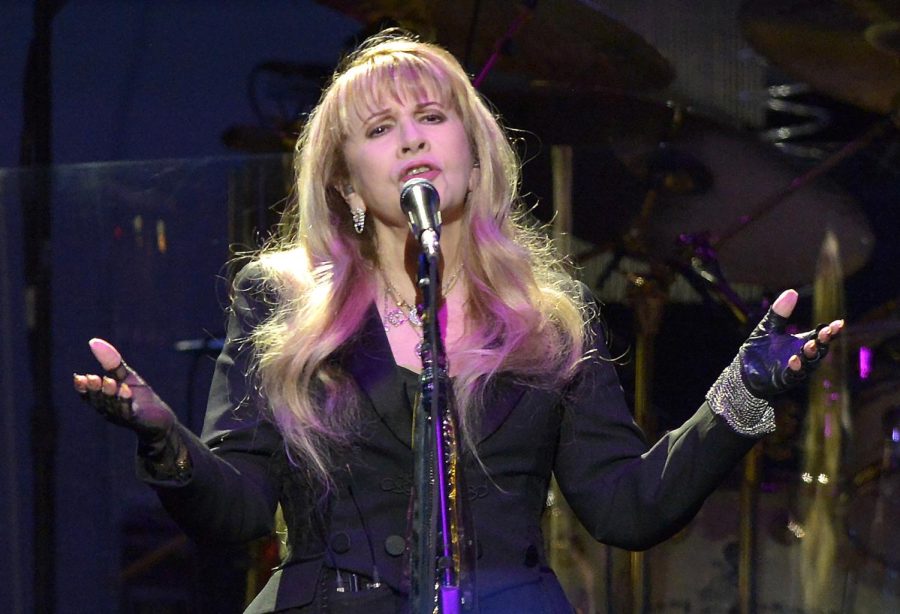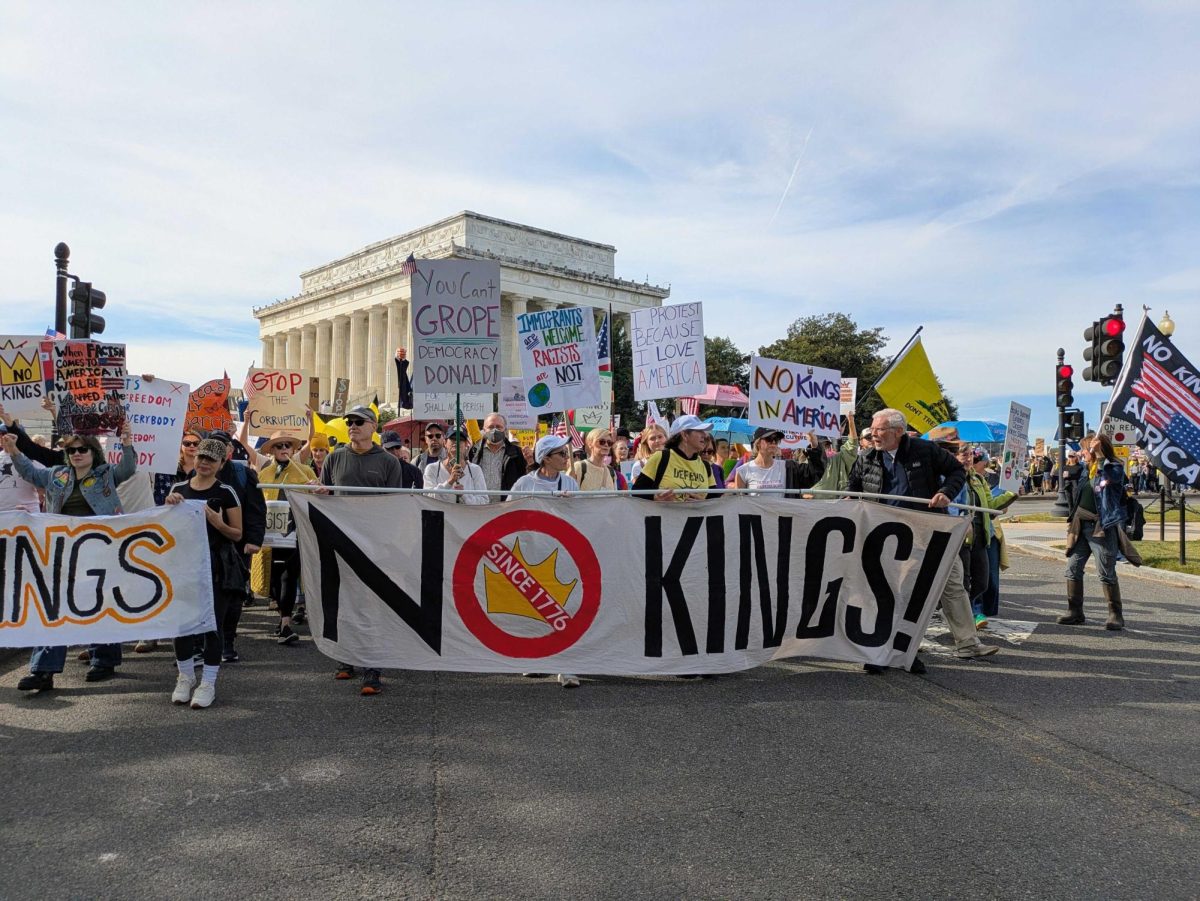Powerful women of yesterday, today and tomorrow
Influential women in the industry pave the way
Stevie Nicks continues to perform and make a name for herself at age 73.
March 23, 2022
With Women’s History Month quickly coming to a close, it would be hard to celebrate the history of our great country without talking about the women who got us here, especially the women who continue to make strides as public figures in the entertainment industry.
Here’s to honoring these women of yesterday, today and tomorrow.
Yesterday:
Stevie Nicks: Of course, my personal favorite woman in the music industry, who was at first an invaluable part of the Fleetwood Mac group and was really only allowed into the group because legendary guitarist Lindsey Buckingham would not join without her.
Nicks was, at a first, a groupie who played the tambourine and with the heartstrings of the men in the group. But as relayed by the book “Making Rumours,” by album co-producer Ken Callait, this all changed obviously when they heard her sing. And then she became a true asset when she began to share the songs she wrote.
This just goes to show how women, especially in a male controlled industry, are underestimated and sexualized so their talents often go unexplored.
Original songs written by Nicks include the painful story of “Silver Springs” and arguably one of the most popular songs from the band, “Rhiannon,” both of which include mystical qualities as valued by the self-proclaimed sorcerer.
Aretha Franklin: Often praised for her performance on Otis Redding’s “Respect,” it is often forgotten the outstanding strides she made for the civil rights movements of the 1960s and ‘70s. Not only was she an advocate for Black rights, performing at civil rights protests, she also supported the fight for Native American rights.
Since then, powerful voices of soul have tried to match and been compared to that of the sound of Franklin, who was equally as powerful on stage as she was when it came to joining the forefront of the human rights battle.
“We all require and want respect, man or woman, black or white,” Franklin once said. “It’s our basic human right.”
Elizabeth Taylor: This name sound familiar? In 1963, the beautiful Taylor became the first female millionaire in film, earning this pretty penny from her lead role in “Cleopatra.”
Like most influential women in the industry, though, her efforts weren’t isolated to the big screen.
Perhaps due to struggles in her own personal life, Taylor was a major AIDS research advocate during the 1980s epidemic.
This was all despite eight marriages and many bouts with illness, proving by example that you can be a successful woman despite the adversity you face and that your relationships or divorces do not define you
Today:
Ava DuVernay: Producer of Netflix miniseries “When They See Us,” DuVernay not only broke ceilings for women, but specifically for Black women. Upon directing the 2014 film “Selma,” the filmmaker became the first Black woman to be nominated at both the Academy Awards and the Golden Globe Awards for best director.
She then moved on to create the miniseries “When They See Us,” which brought light to American racial oppression during the 1989 Central Park Five scandal.
Thus, not only has DuVernay made a difference for her gender and race from behind the camera through her work, she has also helped advocate for these important issues by bringing them to life in the cinema and on a popular streaming service like Netflix.
Robin Roberts: Roberts has been with “Good Morning America” for over 27 years, even after a battle with cancer amidst her career. The “Good Morning America” co-anchor additionally has been in the journalism field for over 30 years as a radio and television producer, reporter and anchor.
Having played basketball at Southeastern Louisiana University, her knack for sports journalism was a given.
At 29, Roberts joined a male-dominated network, ESPN, as a host of “SportsCenter,” paving the way for fellow athletes and female journalists to follow.
Despite her battle with breast cancer and myelodysplastic syndrome, MDS, Roberts was determined to remain in the workforce.
According to her website, “she honored her friends and supporters by choosing to make ‘her mess her message,’ something her mother said often,” which is truly a motto to live by.
Halsey: It is hard to remember the 2018 Women’s March on New York City without recalling the motivational speech delivered by Halsey.
At the march, the young artist, 23 at the time, performed a free verse poem about sexual assault and her power being stolen at the hands of the man, which the march was protesting in the wake of the abortion debate.
The poem is titled “A Story Like Mine.”
She also delivered a poetic performance about being an “inconvenient woman” at Glamour WOTY 2018.
Halsey’s music also aims to empower music, and my personal favorite is her ode to ex-boyfriend G-Eazy, “You Should Be Sad,” which tells the sad yet freeing story of leaving someone who you were good for, but was not good for you.
Her other music carries similar weight, carrying tones of support for all female issues.
One of the most profound quotes living on since her poetry slam at the Women’s March is this, paying tribute to the U.S. Gymnastics athletes abused at the hands of Larry Nassar:
“It’s 2018 and I’ve realized nobody is safe long as she is alive
“And every friend that I know has a story like mine
“And the world tells me we should take it as a compliment
“But then heroes like Ashley and Simone and Gabby, McKayla and Gaga, Rosario, Aly
“Remind me this is the beginning, it is not the finale
“And that’s why we’re here
“And that’s why we rally.”
Tomorrow:
Billie Eilish: Since her emergence at the top of the music charts at age 14 with dance-school project “Ocean Eyes,” Eilish has dominated the pop industry with her unique style and she has always played by her own rules.
Until recently, Eilish has made it a point to not reveal her body or wear stereotypical feminine clothing touted by most popstars her age. Instead, Eilish chooses to wear baggy T-shirts and shorts, which is what she finds most comfortable despite societal norms.
This style also aids her body-positive beliefs.
It wasn’t until she was 18 on the cover of Vogue that she fully embraced her femininity and her sexuality, exactly as she should: on her own terms.
For the cover she ditched her neon hair and her grunge-like style for a softer, classic Marilyn Monroe look, which just proves, to no one but herself, that she is capable of being both feminine and androgynous, or whatever she likes.
This is expressed in her song titled “Not My Responsibility,” where she speaks, “If I shed the layers, I’m a slut / Though you’ve never seen my body / You still judge it / And judge me for it / Why?”
She furthered her feminist points of view and soft style with another song on her most recent album. The “Happier Than Ever” album also features a blunt song about the abuse women endure titled “Your Power.” Specifically, this song draws attention to men in the entertainment industry who take advantage of young girls, thus abusing their power.
This emphasizes the importance of Eilish playing by her own rules, holding true to her own values and creating her own image without fear of failure, because she holds self-respect and morality over fame and fortune.
These moral values are carried into her performances, as she has begun to check in with anxious fans and those who have fallen ill during her concerts. This could, perhaps, be in response to the 2021 AstroFest disaster.
These are not Eilish’s only efforts related to mental health, as she has been blunt with her own struggles, in turn advocating and destigmatizing the conversation for others.
She has also stood her ground on having her songs written and produced by her older brother, Finneas O’Connell, which was a brave choice for a young woman in the industry. This choice has led him to earn five Grammy Awards since 2020.
With all of this in mind, it is doubtful that the 20-year old Eilish will stop here, and I project her contribution to feminism and society as a whole will be immeasurable.
Amanda Gorman: Gorman is someone who has made waves with her words since her inaugural speech at the 2020 presidential election of President Joe Biden. At only 24 years old, she has performed for the Obamas, Lin-Manuel Miranda, Al Gore, Hillary Clinton and Malala Yousafzai due to her impactful messages.
She also graduated cum laude from Harvard University, showing young Black women that this Ivy League degree is possible.
Themes of her work include oppression in terms of gender and race as well as marginalization, which are carried on in her three books published by age 24, one of which is titled “The Hill We Climb” as performed at the inaugural address.
Not only did Gorman make strides for young women writers by speaking at the presidential ceremony, but she also celebrated solidarity with the first female vice president, a Black one at that.
An uplifting piece of her inaugural poem read, “We will not march back to what was, but move to what shall be: a country that is bruised but whole, benevolent but bold, fierce and free.”







Ken Powe • Mar 25, 2022 at 11:39 am
This post was truly worthwhile to read. I wanted to say thank you for the key points you have pointed out as they are enlightening.
Check this out Visions and Dreams: